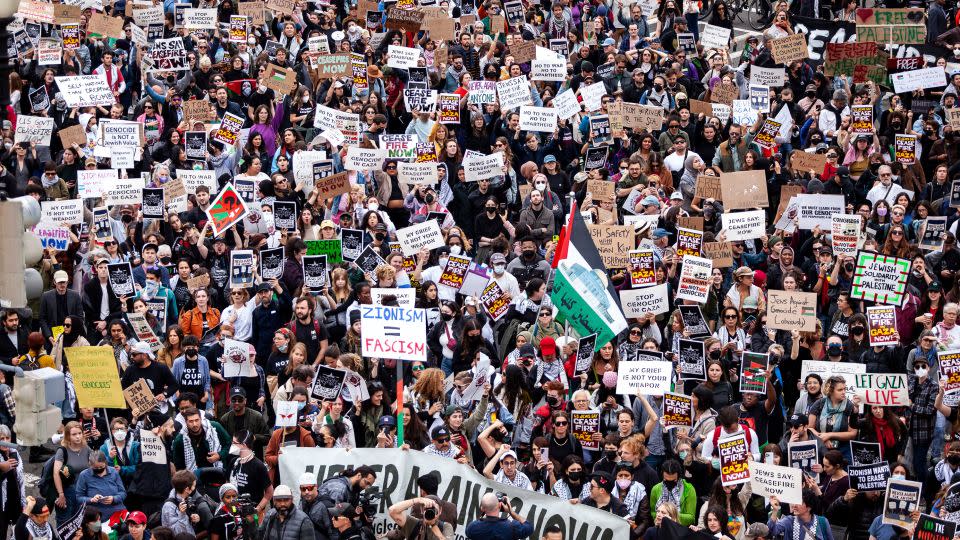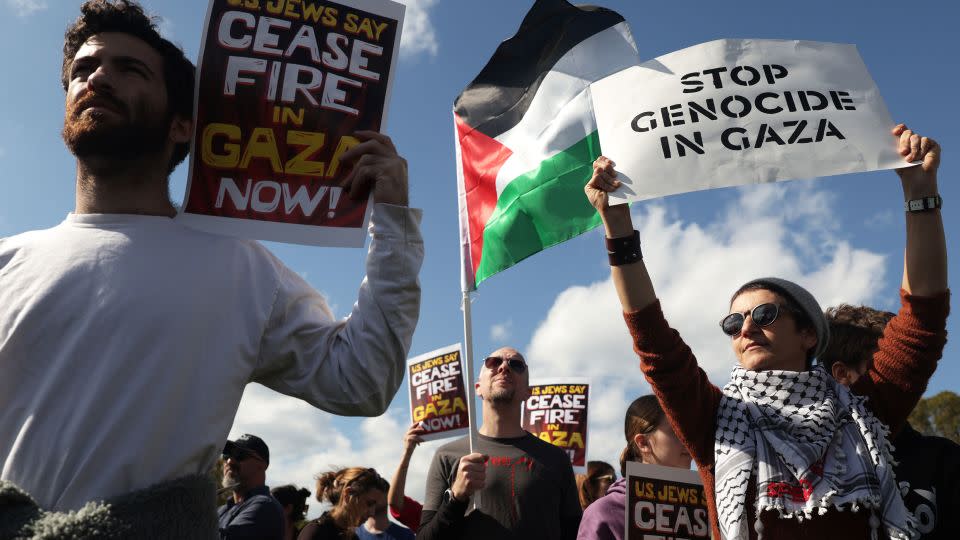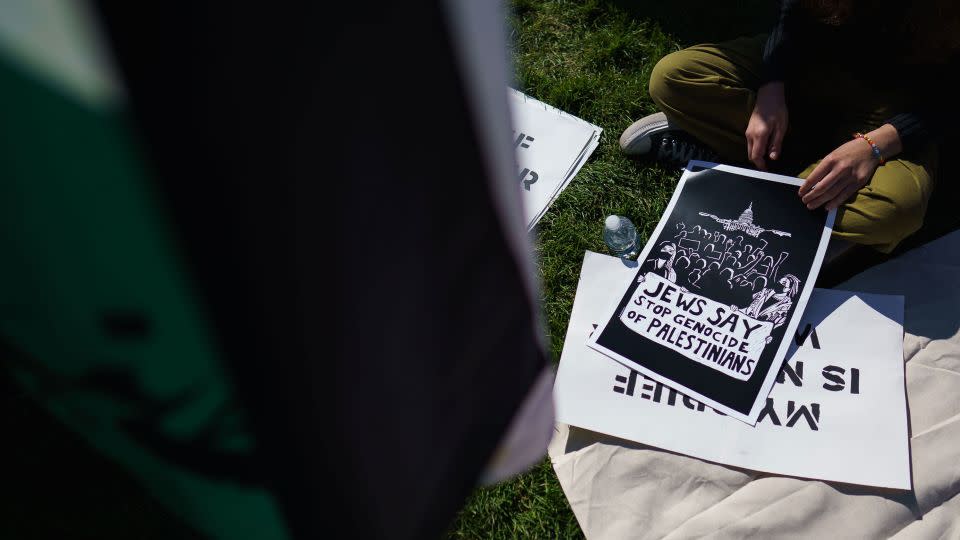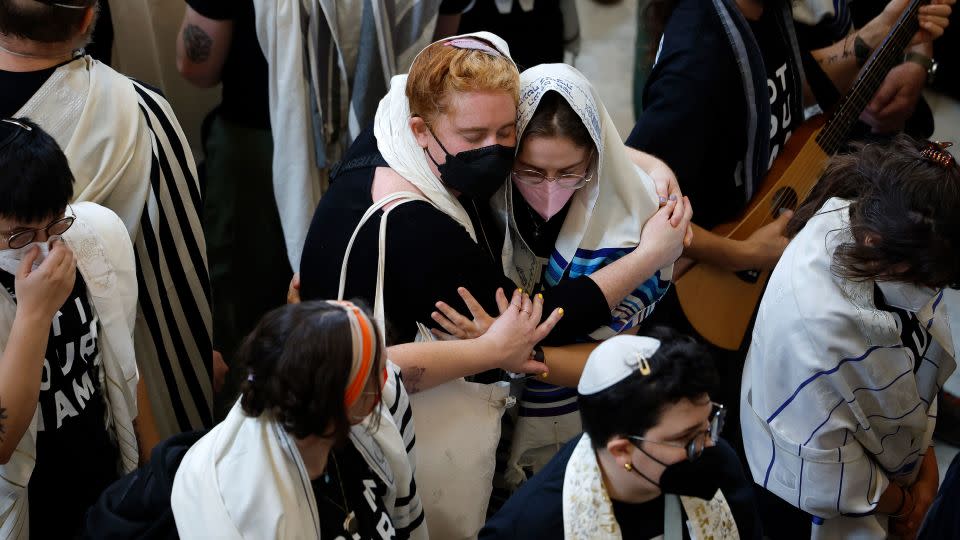‘Not in our name’: Jewish peace activists across the US call for immediate ceasefire and justice for Palestinians
As Rabbi Alissa Wise scrolls through social media, her feed is littered with videos of dead Palestinian children, parents holding their lifeless bodies with screams caught in their throats and eyes sunken with grief.
Like millions around the world, she has been haunted by the gruesome scenes flooding out of Gaza, where civilians have endured more than two weeks of an Israeli siege and bombing campaign that has collapsed homes, destroyed vital infrastructure and sparked a humanitarian crisis.
The airstrikes have killed more than 4,600 Palestinians so far, including an estimated 1,900 children, and wounded at least 14,000 others, according to the Palestinian Ministry of Health in Gaza. Another 1.4 million people have been internally displaced, the United Nation’s Office for the Coordination of Humanitarian Affairs said.
“It’s wretched. I wake up every single morning with tears in my eyes, rage in my heart and I channel it into action,” Wise, a rabbinical council member with Jewish Voice for Peace, told CNN. “My coping mechanism is to yell into the void, yell into the halls of Congress.”
She feels the same grief and horror over Hamas’ surprise attack in Israel on October 7, when the militant group brutally killed more than 1,400 people, including civilians and military personnel, and abducted over 200 others, according to the Israel Defense Forces.
Israel says its mission in Gaza is to root out and destroy Hamas, which governs the small territory. But it is the 2.2 million Palestinians living there, unable to escape, who are bearing the brunt of the attacks.
It is these lives that Wise and other Jewish American peace activists are mobilizing to save with their calls for an urgent ceasefire – even when doing so puts them at odds with some groups within their own community, including the Anti-Defamation League, who’ve questioned their morals and even accused them of being anti-Israel.
On Wednesday, thousands of Jews and allies marched on Capitol Hill, where they carried Palestinian flags and rallied in support of Palestinian rights, while Wise led a smaller sit-in with hundreds of activists inside one of the Capitol buildings. The action was organized by Jewish Voice for Peace and IfNotNow, two of the largest US Jewish groups calling for a just and peaceful resolution to the Israeli-Palestinian conflict.

At the sit-in, led by two dozen rabbis, they blew shofars, a traditional horn made from ram’s horn and used in Jewish rituals, and shared testimonials from Palestinians suffering in Gaza. They wore shirts that read, “Not in our name,” and unfurled banners demanding a “ceasefire.”
The activists also called on the US government to stop providing aid to Israel, which Wise says “encourages and funds the mass murder of Palestinians.”
Wise was one of more than 355 activists, mostly Jewish, arrested during the event, according to Jewish Voice for Peace spokesperson Sonya Meyerson-Knox.
Thousands more Jewish Americans continue to gather in protests across the United States, calling on President Joe Biden and other elected officials to rein in Israel – arguing more civilian deaths is not the answer to Hamas’ deadly attack.
“As Jewish people whose ancestors went through the Holocaust, when we hear Prime Minister Benjamin Netanyahu and Defense Minister Yoav Gallant use words like ‘the children of darkness’ and ‘human animals’ to describe Palestinians, we feel the resonances of that in our bones,” said IfNotNow political director Eva Borgwardt, referring to recent comments made by the Israeli officials.
“We know exactly where that language leads, and we are here to stop what they clearly intend to be a genocide. We will come to the doors of our lawmakers, we will be at the doors of our lawmakers for as long as it takes.”
‘Never again for anyone’
Moments after Rabbi Wise was released by authorities, she learned one of her closest Palestinian friends lost his entire family in an Israeli airstrike in Gaza.
“I fell in a puddle on the floor. It was a very sobering reminder of exactly what we’re trying to prevent,” Wise said. “It’s critical for American Jews to stand up and say, ‘never again’ is never again for anyone.” The slogan has been a rallying cry of the Jewish community since World War II.
“If we’re going to learn anything from history, it’s that the things that we stand for are for everybody, no exception, and that includes Palestinians,” she added. “We’re pulling back on organizations that suggest Jewish safety must come at the expense of Palestinian life. We say, it’s not either-or, it’s all of us or none of us.”
In addition to organizing civil actions, Jewish Voice for Peace and IfNotNow are also educating communities through digital media, engaging with journalists, organizing petition drives and coordinating telephone and email campaigns aimed at elected officials and news organizations. Much of their work is done in partnership with smaller Jewish groups, as well as Arab, Muslim and Palestine solidarity activists.

Jewish Voice for Peace, founded in 1996, describes itself as the largest Jewish pro-Palestinian organization in the world, with over 440,000 members and supporters across 30 states. IfNotNow also has a large US network, with tens of thousands of Jewish members who have taken direct actions to protest the Israeli occupation since 2014.
“The work of our movements over the past nine years and decades of work by our predecessors has been preparing all of us to meet this horrific, genocidal moment,” Borgwardt said. “Stopping this war feels like the biggest test of our lifetimes. We understand how we got here and that to end this nightmare and achieve true safety for Palestinians, Israelis and Jews, we need to end decades of occupation and apartheid and fight for equality, justice and a thriving future for all.”
Still, Jewish groups that advocate for Palestinian rights face a lot of criticism, especially from pro-Israel groups who say they’re naive, misled or even antisemitic.
Jonathan Greenblatt, CEO and national director for the Anti-Defamation League, told CNN that he respects the protesters’ right to free speech, but criticized them for what he called a “complete lack of moral clarity,” adding Hamas – not Israel – is responsible for the deaths of innocent civilians in Gaza.
Meredith Weisel, the ADL’s DC regional director, also dismissed the protesters on Capitol Hill as a fringe minority.
“Although they claim to do so, these far-left radical organizations do not represent the overwhelming majority Jewish community,” Weisel said in a statement on X. “Rather, these groups are anti-Zionists that challenge Israel’s very right to exist. Let’s be very clear – anti-Zionism is antisemitism.”
Wise adamantly disagrees, explaining Zionism is the nationalist movement that emerged in the 19th century to support establishing a homeland for Jewish people in Palestine, which was administered by the British at the time. It’s not the same as Judaism, she says.
“I am Jewish, I’m not a Zionist, and I reject the idea that critiquing the politics of a government, the way you would any other government, is antisemitic. Israel is not a Jew, Israel is a state,” Wise said. “The claim that it’s antisemitic is used as a cudgel to silence people and it’s really egregious, the way that they manipulate Jewish trauma.”
Wise has experienced backlash for her Palestine solidarity work from within her own community – and even family.
“The next time I’m at a family table, I’m kind of avoiding and dreading it. But I also feel like the important thing is that we have to fight for the future we want. I feel that the heartache of distance from my family has to be mitigated by a sense of another family and another community that you’re organizing with.”

Borgwardt of IfNotNow says her group is not anti-Zionist but anti-occupation, and that she is too focused on organizing for a ceasefire to care what critics say.
“As Jewish Americans, we are here through our grief to tell Biden and Congress that our grief is not their weapon and our pain is not their excuse to enable a government that has clearly genocidal intent, and they must call for a ceasefire now,” Borgwardt said.
“We are here to scream louder than we ever have: Not in our name.”
Suffering for 75 years and counting
During Wednesday’s sit-in, the halls of Congress echoed with the synchronized voices of hundreds of Jewish Americans shouting: “End killing and the funding of killing!”
The activists and their allies filled the rotunda, donning black shirts and keffiyehs, the traditional black and white checkered scarf of the Palestinian people. In between their cries for justice came tears – and long, silent hugs.
“It felt so powerful and necessary to be surrounded by thousands of grieving Jews demanding that our leaders find the courage to end this violence and finally, after decades, to address its root cause: the lie that Jewish and Israeli safety requires Palestinian suffering,” Borgwardt said.

Meyerson-Knox, of Jewish Voice for Peace, was also in attendance and told CNN her heart breaks for all Israelis and Palestinians killed, but she knows this war didn’t erupt in a vacuum.
“The clock didn’t start on October 7,” she said. “The horrible acts that Hamas took are in no way isolated from the horrors of Israel’s military occupation and apartheid system that it has run against Palestinians for 75 years.”
That’s not an excuse or a justification, Meyerson-Knox says, it’s just reality.
More than half of Gaza’s population are refugees whose ancestors fled or were expelled from their homes in present-day Israel by armed Jewish groups during the 1948 Arab-Israeli War, which Palestinians call al-Nakba or “the catastrophe.” Israel has never allowed them to return to their homes and many have lived in poverty ever since.
In 1967, Israel seized control of Gaza in the Six-Day War with Egypt, Jordan and Syria, and held it for nearly 40 years before withdrawing troops and settlers in 2005. Since then, Israel, in coordination with Egypt, has imposed a blockade that critics say transformed Gaza into “the world’s largest open-air prison.”
Hostilities have regularly broken out between Israel and Palestinian factions in Gaza, including Hamas, which was elected to power in 2006 and ousted its opposition in 2007.
The situation for Palestinians in the Israeli-occupied West Bank and refugee camps in surrounding countries is similarly dire.
Jewish Voice for Peace and IfNotNow believe that only by addressing these issues can peace ever be achieved between Israelis and Palestinians.
In this latest war, it’s difficult to predict what comes next – other than more anger, pain and sorrow, Wise says.
Conditions are growing more desperate each day, the World Health Organization warns, with hospitals on the verge of collapse and Palestinians in Gaza fast running out of food, water and other critical supplies amid near-constant bombardment by Israel.
Meanwhile, the activists say videos emerging from the territory are becoming increasingly alarming. One of the latest shows Palestinian parents inking their children’s names on their arms and legs so that if they’re killed, they can be identified.
“The only way for me to maintain hope,” Wise said, “and to imagine a future of a free Palestine, of safety and freedom for all of us, is to take action even in the midst of the pits of despair.”
For more CNN news and newsletters create an account at CNN.com
